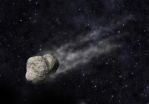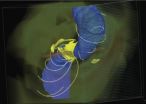(Press-News.org) It's not unusual for cancer patients being treated with chemotherapy to complain about not being able to think clearly, connect thoughts or concentrate on daily tasks. The complaint – often referred to as chemo-brain – is common. The scientific cause, however, has been difficult to pinpoint.
New research by Rutgers University behavioral neuroscientist Tracey Shors offers clues for this fog-like condition, medically known as chemotherapy-induced cognitive impairment. In a featured article published in the European Journal of Neuroscience, Shors and her colleagues argue that prolonged chemotherapy decreases the development of new brain cells, a process known as neurogenesis, and disrupts ongoing brain rhythms in the part of the brain responsible for making new memories. Both, she says, are affected by learning and in some cases are necessary for learning to occur.
"One of the things that these brain rhythms do is to connect information across brain regions," says Shors, Professor II in the Department of Psychology and Center for Collaborative Neuroscience at Rutgers. "We are starting to have a better understanding of how these natural rhythms are used in the process of communication and how they change with experience."
Working in the Shors laboratory, postdoctoral fellow Miriam S. Nokia from the Department of Psychology at the University of Jyvaskyla in Finland and Rutgers neuroscience graduate student Megan Anderson treated rats with a chemotherapy drug – temozolomide (TMZ) – used on individuals with either malignant brain tumors or skin cancer to stop rapidly dividing cells that have gone out of control and resulted in cancer.
In this study, scientists found that the production of new healthy brain cells treated with the TMZ was reduced in the hippocampus by 34 percent after being caught in the crossfire of the drug's potency. The cell loss, coupled with the interference in brain rhythms, resulted in the animal being unable to learn difficult tasks.
Shors says the rats had great difficulty learning to associate stimulus events if there was a time gap between the activities but could learn simple task if the stimuli were not separated in time. Interestingly, she says, the drug did not disrupt the memories that were already present when the treatment began.
For cancer patients undergoing long-term chemotherapy this could mean that although they are able to do simple everyday tasks, they find it difficult to do more complicated activities like processing long strings of numbers, remembering recent conversations, following instructions and setting priorities. Studies indicate that while most cancer patients experience short-term memory loss and disordered thinking, about 15 percent of cancer patients suffer more long-lasting cognitive problems as a result of the chemotherapy treatment.
"Chemotherapy is an especially difficult time as patients are learning how to manage their treatment options while still engaging in and appreciating life. The disruptions in brain rhythms and neurogenesis during treatment may explain some of the cognitive problems that can occur during this time. The good news is that these effects are probably not long-lasting," says Shors.
### END
Rutgers neuroscientist sheds light on cause for 'chemo brain'
Study finds fog-like condition related to chemotherapy's effect on new brain cells and rhythms
2013-02-21
ELSE PRESS RELEASES FROM THIS DATE:
Mercury may have harbored an ancient magma ocean
2013-02-21
CAMBRIDGE, MA -- By analyzing Mercury's rocky surface, scientists have been able to partially reconstruct the planet's history over billions of years. Now, drawing upon the chemical composition of rock features on the planet's surface, scientists at MIT have proposed that Mercury may have harbored a large, roiling ocean of magma very early in its history, shortly after its formation about 4.5 billion years ago.
The scientists analyzed data gathered by MESSENGER (MErcury Surface, Space ENvironment, GEochemistry, and Ranging), a NASA probe that has orbited the planet since ...
Discovering the birth of an asteroid trail
2013-02-21
Unlike comets, asteroids are not characterised by exhibiting a trail, but there are now ten exceptions. Spanish researchers have observed one of these rare asteroids from the Gran Telescopio Canarias (Spain) and have discovered that something happened around the 1st July 2011 causing its trail to appear: maybe internal rupture or collision with another asteroid.
Ten asteroids have been located to date that at least at one moment have displayed a trail like that of comets. They are named main-belt comets (MBC) as they have a typical asteroidal orbit but display a trail ...
Activation of cortical type 2 cannabinoid receptors ameliorates ischemic brain injury
2013-02-21
Philadelphia, PA, February 21, 2013 – A new study published in the March issue of The American Journal of Pathology suggests that cortical type 2 cannabinoid (CB2) receptors might serve as potential therapeutic targets for cerebral ischemia.
Researchers found that the cannabinoid trans-caryophyllene (TC) protected brain cells from the effects of ischemia in both in vivo and in vitro animal models. In rats, post-ischemic treatment with TC decreased cerebral infarct size and edema. In cell cultures composed of rat cortical neurons and glia exposed to oxygen-glucose deprivation ...
Backs bear a heavy burden
2013-02-21
Trudging from place to place with heavy weights on our backs is an everyday reality, from schoolchildren toting textbooks in backpacks to firefighters and soldiers carrying occupational gear. Muscle and skeletal damage are very real concerns. Now Tel Aviv University researchers say that nerve damage, specifically to the nerves that travel through the neck and shoulders to animate our hands and fingers, is also a serious risk.
Prof. Amit Gefen of TAU's Department of Biomedical Engineering and Prof. Yoram Epstein of TAU's Sackler Faculty of Medicine, along with PhD student ...
Study reveals new clues to Epstein-Barr virus
2013-02-21
BOSTON -- Epstein-Barr virus (EBV) affects more than 90 percent of the population worldwide and was the first human virus found to be associated with cancer. Now, researchers from Beth Israel Deaconess Medical Center (BIDMC) have broadened the understanding of this widespread infection with their discovery of a second B-cell attachment receptor for EBV.
The new findings, which currently appear on-line in Cell Reports, reinforce current directions being taken in the development of a vaccine to guard against EBV, and raise important new questions regarding the virus's ...
UCLA study finds endocrine disorder is most common cause of elevated calcium levels
2013-02-21
Unusually high calcium levels in the blood can almost always be traced to primary hyperparathyroidism, an undertreated, underreported condition that affects mainly women and the elderly, according to a new study by UCLA researchers.
The condition, which results from overactive parathyroid glands and includes symptoms of bone loss, depression and fatigue that may go undetected for years, is most often seen in African American women over the age of 50, the researchers discovered.
The study, currently online in the Journal of Clinical Endocrinology and Metabolism, ...
Journey to the limits of spacetime
2013-02-21
Voracious absences at the center of galaxies, black holes shape the growth and death of the stars around them through their powerful gravitational pull and explosive ejections of energy.
"Over its lifetime, a black hole can release more energy than all the stars in a galaxy combined," said Roger Blandford, director of the Kavli Institute for Particle Astrophysics and Cosmology and a member of the U.S. National Academy of Science. "Black holes have a major impact on the formation of galaxies and the environmental growth and evolution of those galaxies."
Gravitational ...
Baylor University researchers study barriers, resources to physical activity in Texas towns
2013-02-21
WACO, Texas (Feb. 20, 2013) —Obesity, diabetes and other ailments plague impoverished communities at higher rates than the general United States population. In rural Texas border towns, or colonias, Mexican-American residents are at an even greater risk for chronic health problems.
Physical activity has shown to reduce the risks for chronic health problems, but "few Mexican-American and lower-income Americans, including children, engage in physical activity that bring about health benefits," according to a study conducted by Baylor University and Texas A&M University ...
How human language could have evolved from birdsong
2013-02-21
CAMBRIDGE, MA -- "The sounds uttered by birds offer in several respects the nearest analogy to language," Charles Darwin wrote in "The Descent of Man" (1871), while contemplating how humans learned to speak. Language, he speculated, might have had its origins in singing, which "might have given rise to words expressive of various complex emotions."
Now researchers from MIT, along with a scholar from the University of Tokyo, say that Darwin was on the right path. The balance of evidence, they believe, suggests that human language is a grafting of two communication forms ...
Facing disaster while averting tragedy
2013-02-21
This press release is available in French.
Montreal, February 21, 2013 – Nobody can foresee disaster, but changing climate conditions are prompting smart communities increasingly to prepare for them with solid emergency response plans and protocols. Images as recent as those from the 2011 wildfire in Slave Lake, Alberta or as distant as those from the 1998 ice storm in Eastern Ontario and Quebec are distressing reminders that no area is immune from devastation, and reinforce the need to be prepared.
Yet while emergency responses may originate through official channels, ...
LAST 30 PRESS RELEASES:
Scientists show how to predict world’s deadly scorpion hotspots
ASU researchers to lead AAAS panel on water insecurity in the United States
ASU professor Anne Stone to present at AAAS Conference in Phoenix on ancient origins of modern disease
Proposals for exploring viruses and skin as the next experimental quantum frontiers share US$30,000 science award
ASU researchers showcase scalable tech solutions for older adults living alone with cognitive decline at AAAS 2026
Scientists identify smooth regional trends in fruit fly survival strategies
Antipathy toward snakes? Your parents likely talked you into that at an early age
Sylvester Cancer Tip Sheet for Feb. 2026
Online exposure to medical misinformation concentrated among older adults
Telehealth improves access to genetic services for adult survivors of childhood cancers
Outdated mortality benchmarks risk missing early signs of famine and delay recognizing mass starvation
Newly discovered bacterium converts carbon dioxide into chemicals using electricity
Flipping and reversing mini-proteins could improve disease treatment
Scientists reveal major hidden source of atmospheric nitrogen pollution in fragile lake basin
Biochar emerges as a powerful tool for soil carbon neutrality and climate mitigation
Tiny cell messengers show big promise for safer protein and gene delivery
AMS releases statement regarding the decision to rescind EPA’s 2009 Endangerment Finding
Parents’ alcohol and drug use influences their children’s consumption, research shows
Modular assembly of chiral nitrogen-bridged rings achieved by palladium-catalyzed diastereoselective and enantioselective cascade cyclization reactions
Promoting civic engagement
AMS Science Preview: Hurricane slowdown, school snow days
Deforestation in the Amazon raises the surface temperature by 3 °C during the dry season
Model more accurately maps the impact of frost on corn crops
How did humans develop sharp vision? Lab-grown retinas show likely answer
Sour grapes? Taste, experience of sour foods depends on individual consumer
At AAAS, professor Krystal Tsosie argues the future of science must be Indigenous-led
From the lab to the living room: Decoding Parkinson’s patients movements in the real world
Research advances in porous materials, as highlighted in the 2025 Nobel Prize in Chemistry
Sally C. Morton, executive vice president of ASU Knowledge Enterprise, presents a bold and practical framework for moving research from discovery to real-world impact
Biochemical parameters in patients with diabetic nephropathy versus individuals with diabetes alone, non-diabetic nephropathy, and healthy controls
[Press-News.org] Rutgers neuroscientist sheds light on cause for 'chemo brain'Study finds fog-like condition related to chemotherapy's effect on new brain cells and rhythms

